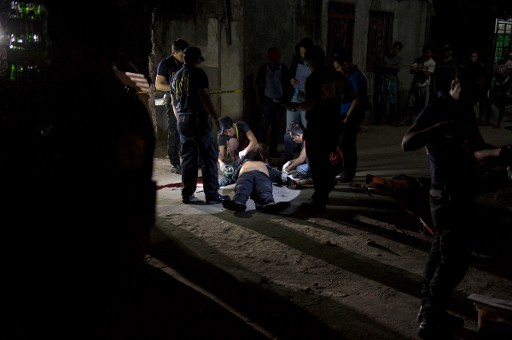SC urged to craft new protective writ against drug killings

This picture taken on January 18, 2017, shows policemen investigating a body of an alleged drug user on the ground after an unidentified gunmen shot him dead in Manila.
AFP FILE PHOTO
A nongovernment organization of lawyers on Wednesday urged the Supreme Court to issue a new protective writ that will look into the spate of drug-related killings amid the Duterte administration’s war on drugs.
In its 14-page letter petition, the Center for International Law asked the high court to create a Writ “Contra Homo Sacer,” which it said will allow a new mandatory inquest procedure to address the increasing extrajudicial killings from police or vigilante operations. The lawyers said the new writ will require the police to produce a full documentation of any operation, “from planning to its implementation and its aftermath.”
“This includes the mandatory submission of detailed reports, forensic evidence, autopsy reports and the like, that comply with international standards. Many of these documentary requirements, while already provided under existing rules of the Department of Justice and the Philippine National Police (PNP), are often ignored by authorities,” the Center said in a statement.
“Thus, to ensure full compliance by both public prosecutors and law enforcement agencies, the Center asked the High Court to incorporate them into an amendment to the Rules of Criminal Procedure or into a new class of protective writs similar to what it had earlier issued, namely the Writ of Amparo and the Writ of Habeas Data,” it added.
The lawyers said their petition aimed to prevent “drug suspects or any other criminal suspects from being treated as homo sacer and from being subject to banishment to the realm of uncertain fate.” Homo sacer, they said, was legal concept from ancient Roman law recently recovered by Italian philosopher Giorgio Agamben, which refers to a class of persons treated as outlaws and without any rights.
Article continues after this advertisement“We write to implore the Supreme Court to promulgate additional rules on criminal procedure to help prevent the disturbing emergence of a class of people who – harking back to ancient Roman times – are no more than homo sacer, or beings reduced to mere biological existence, denied of all rights, marked for execution anytime and anywhere,” the group said.
Article continues after this advertisement“The obligation of police officers to turn over records, documents, and all evidence in connection with the commission of a crime as they themselves allege, must be required all the more if the suspect ends up dead, either at the hands of police officers or unknown assailants,” it added.
The lawyers said the high tribunal may adopt international standards laid down by the UN Minnesota Protocol on the Effective Prevention and Investigation of Extra-Legal Killings, Arbitrary and Summary Executions, Enforced Disappearances and Torture in crafting the new writ.
The group earlier filed a Writ of Amparo petition for the family of four men allegedly killed by members of the Quezon City Police District in Payatas during an Oplan Tokhang operation.